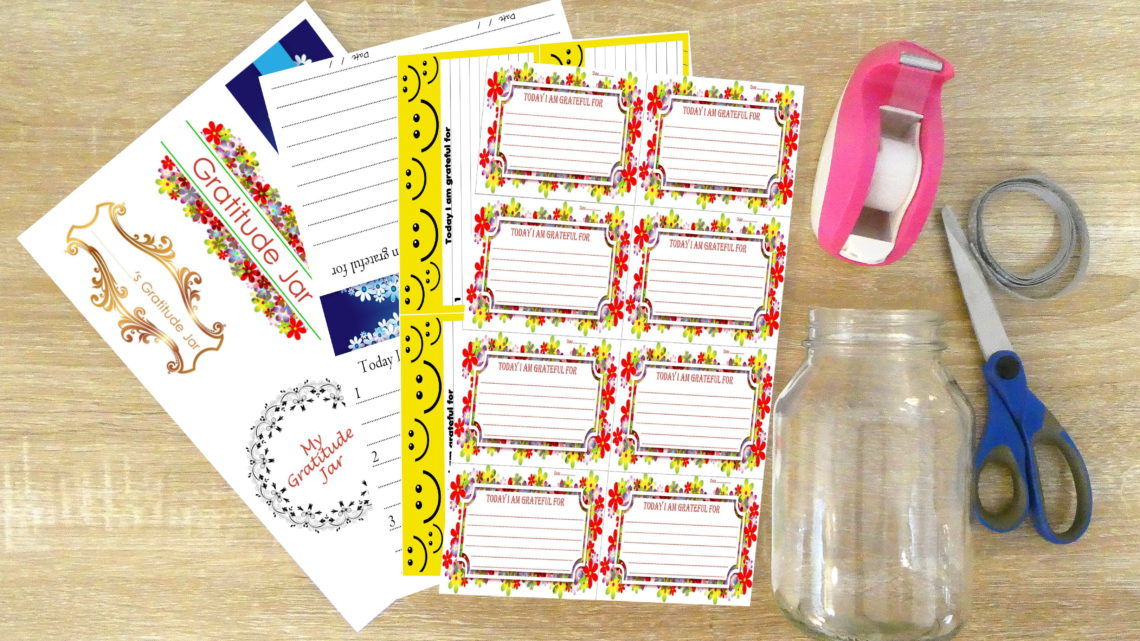
What is a Gratitude Jar? ~ And how to make one!
What is a Gratitude Jar? It is a jar where you collect what you are grateful for. Write down what you are grateful for and place the Gratitude Note into your Gratitude Jar on a daily basis. Some people choose to do this once or twice a week. It is very powerful to take notes out of your Gratitude Jar from time to time and see all the blessings in your life.
If you would like to read a bit more on Gratitude, please click here.
But now let’s look into making one! (And please continue reading as I’ll also list benefits, different ways we can express and practice Gratitude as well as writing prompts in case we need ideas for what we can add to our Gratitude Jars or Gratitude Journals.)
How to make a Gratitude Jar:
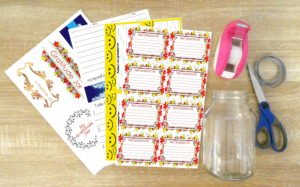
This is What You Need
- Click here to download the Gratitude Jar label and daily Gratitude blank notes
- Choose a jar large enough to hold many daily Gratitude notes
- Print and attach the ‘Gratitude Jar’ label
- Decorate the jar with ribbon or string if you wish
- Print and cut the blank Gratitude notes for daily use – there are 5 different designs to choose from
Why not make two; and give away one Gratitude Jar to a family member or friend. Please ask them to visit this website to download further blank Gratitude notes.
What are the benefits of Gratitude?
Martin Seligman, Robert Emmons, Sonia Lyubomirsky and Barbara Frederickson are positive psychologists who have all been researching the importance of gratitude since the late 1990s.
- Gratitude increases life satisfaction on a long term basis and makes us feel better
- Overall, it improves well-being (emotional, mental, spiritual)
- Our brains cannot focus on both positive and negative things at the same time. Gratitude helps us to appreciate what we have – and shifts our focus away from what we don’t have
- It uplifts the spirit and soul
- It helps us to remember the things that make us happy – ultimately we feel happier and it also helps us to feel stronger positive emotions like joy and optimism. This consequently reduces the negative feelings we might have at times.
- We become less materialistic when we focus on being more grateful for the non-material things in life – we will truly feel what we are blessed with
- Some studies have shown that gratitude can also help with becoming more self-empowered, more spiritual and more conscious
- Gratitude can also help us with being more social. When being more grateful, we are ultimately more respectful, less self-centred, more compassionate, forgiving and generous
- This helps with improving relationships
- Some studies, as outlined on Happier Human, have shown that gratitude makes us healthier. It can reduce stress, improve sleep, encourage us to exercise more and feel more energetic
- Gratitude can help increase productivity – may this be in our personal or professional lives
- Gratitude creates more space for happiness and joy in our lives
- It can help us to gain more clarity in our lives, knowing what is important to us and focus on what really matters
- This clarity also results in knowing and learning more about ourselves and becoming more self-aware
We can intentionally develop and learn Gratitude. It is a skill.
Different ways we can express and practice Gratitude and become stronger in this virtue
- Writing down three things we are grateful for on a daily basis. This can be in the morning or at the end of the day. There are several ways you can practice this, for example using a Gratitude Jar as explained above or by writing in a Gratitude Journal
- Creating a Gratitude Wall – instead of placing your Gratitude Notes into a Jar, why not stick them to your wall or large piece of paper on your wall
- Creating a Gratitude Board or Collage – adding photos to your board that depict Gratitude in your life
(images of people, objects, places you have visited, basically everything you are grateful for)
- Counting our blessings – even (or especially) on days where things could run more smoothly, remembering the blessings and gifts we have in our lives can be very uplifting. If you use a Gratitude Jar or Journal (or another way to record your blessings) you can always refer back to it during difficult times; or when it is hard to come up with something positive during the more challenging times
- Giving up things for a week or two can help us with discipline but also with Gratitude – let’s take eating chocolate. Imagine not eating chocolate for a week or two. How will you feel and appreciate it after that period of time? Some people give up things or foods they enjoy during the season of lent which starts on Ash Wednesday and finishes on Easter Sunday. This approach can also help us not to take things for granted but truly appreciate them and ultimately practice Gratitude
- Going on a savoring walk – going for a 20 minute walk once a week and not only focusing on the blessings we have in our lives but also all the positivity we see/hear/feel/smell in our surroundings
- Clean air
- Green grass and trees around us
- The beauty of nature
- Birds, animals
- Other pedestrians
- Saying thank you – expressing gratitude to family, friends and co-workers on a continuing and sincere basis. Why not send a note or letter to close family members and friends from time to time, express your gratitude for them being in your life and how they positively contribute to your life. This will not only make you feel better but I am sure they will be receiving it in a positive manner, too. A study by Martin Seligman even suggested taking and reading the letter in person which enhances the feelings of gratitude
- Integrating Gratitude Affirmations into your daily life
- Meditating – there are many guided meditations available on gratitude
- Carrying with you a Gratitude Stone or another object that you can associate with Gratitude. Every time you see, feel or touch it, let this remind you of being grateful for something in your life or at that particular moment
- Committing yourself to practice Gratitude for a minimum of 30 days – why not draw a table or schedule on a piece of paper and tick it every day you practice Gratitude – this will also help with not skipping a day
What can we write in our Gratitude Journal or Jar? – a few prompts and ideas
- If you find it difficult at times to come up with things you are grateful for, why not think about how your life would be without certain things. Imagine how it would feel or be without it in your life. There is a saying ‘We only know what we have when we are about to lose it.’ Keeping this in mind, this can really help us to value what we have – as we don’t want to live without it.
- Going through the alphabet to find prompts for Gratitude
We can be grateful for
- people in our lives (family members, friends, neighbours, teachers, mentors, colleagues, etc.)
- people who make us smile and feel happy
- the ability to see, smell, feel, hear, touch and love
- your strengths, skills and talents
- times that you have helped others
- times that others have helped you
- surprises that pop up every now and then
- being healthy
- having enough food and water every day
- the place /area we live in
- living in a safe and secure home
- being able to work; certain aspects at work
- having a computer and being able to research and practice self-empowerment and development
- things we take for granted
- catching up with friends, having a good time
- practicing a hobby and activities that we enjoy
- exercising, being able to exercise
- nature around us
- experiences where you acted in a calm and harmonious manner
- the ability to have certain routines and / or habits
- past joyful experiences (on a daily, weekly, monthly basis)
- holidays
- positive childhood memories and blessings
- music, art, creativity
- accomplishments in our lives (personal, professional)
- things we have learned and are grateful for
- animals/pets in our lives
- sports
- family traditions
- friendship traditions
- how you have shared/expressed gratitude to others and ultimately added gratitude to both your lives
- certain books that you have read and added value to your life
- recipes and the ability to cook delicious meals
- times you have treated yourself
- certain belongings in our lives
- spring, summer, autumn, winter – or the dry and wet season if you live in the tropics
I would love to hear from you with comments, ideas and other ways you have integrated and practice Gratitude.
Blessings,
Edith

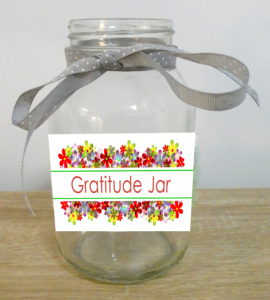
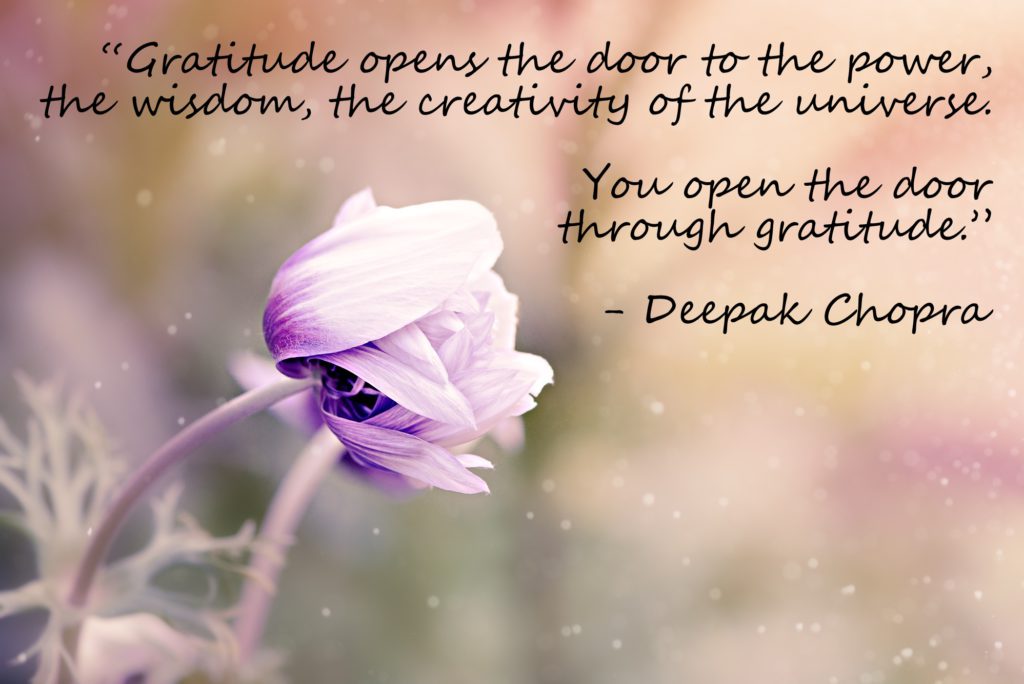
 (images of people, objects, places you have visited, basically everything you are grateful for)
(images of people, objects, places you have visited, basically everything you are grateful for)
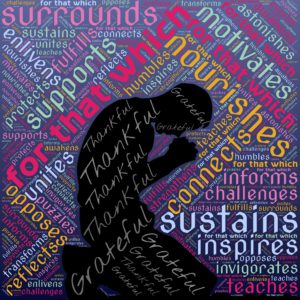






Hey,
Thanks for sharing this amazing article . I know , A gratitude jar is a fun way to provide a visual reminder of the many blessing in our lives . Some people add something on a daily basis , some do it randomly and some add things when they are having an especially hard time .I created a gratitude jar a couple of months ago . I believe , keeping a gratitude jar is one of the most powerful things you can do to create huge positive changes within your life . I will share this information with my all friends .
Hi Arnaiemhasan, it is great to hear that you are already using a Gratitude Jar and thank you so much for sharing your experience. It is wonderful to see that such a ‘simple’ way of practicing Gratitude can make such a big difference in our lives. Thank you also for sharing this information with your friends. Wishing you all the best, Edith
I agree we need to take stock and be grateful of what we have . It improves our spirit and our outlook on life…and I think we become less self-centred!
Do you know that yesterday they had a professor from oxford on the telly with new health findings when people are kind to themselves and others, that the heart rate goes down? Gratefulness I think is similar….good for your health!
Hi Liz, that is a very interesting research / health study. Thank you so much for sharing this. And yes, being kind and being grateful comes with many benefits. Thanks again! Edith
HI EDITH,
Thank you for sharing this wonderful article with us. Gratitude and forgiveness depends on human behavior and family culture. Some time we are unaware of this issue because of our struggle life and environmental situation. But when human pray and think silently they feel those types of mental satisfaction which includes gratefulness and others helpful memories also. I am going to share this inspirational article with my close friends and family members. Thanks for sharing this helpful information.
Hi Mzakapon, yes, that is true. Thank you so much for pointing this out. Thank you also for taking the time to read this post and for sharing it with friends and family. I appreciate it. All the best, Edith
I love the idea of a gratitude jar. Often we get so caught up in our busy days that we forget to remember how much we have to be grateful for. Then at times when we’re down its hard to remember how much we really have. Like you say, there is so much to be grateful for- we just have to open our eyes to it!
Hi Hollie, thank you so much for your time reading this post and commenting. That is true. And I feel that the above ways can help us with being grateful. I hope that there is at least one ‘way’ of expressing Gratitude available for each of us. I personally use a Gratitude Journal and I am considering the idea of also starting a Gratitude Jar; but as said above, the means does not matter as much as the actual practice of Gratitude. Thanks again. All the best, Edith
Gratitude journal is the one I think I like most. Gratitude jar or gratitude journal helps us not to be forgetting our blessings. It makes us to always remember the good things we have received from God and that makes us to live a life of gratitude. A life of gratitude is a life that is grateful and appreciative. This could make one receive more blessings from God. If you have a gratitude journal. It’s good you have a time or a particular day you normally visit your gratitude journal. It could help you to always remember your blessings.
Hi Kenechi, thank you so much for taking the time to read my post. Yes, you are right, I personally believe it is important to have a set time every day or particular day every week to dedicate to Gratitude. I use a Gratitude Journal and like to write in it in the evenings and at the same time, ‘review’ my day and remind myself of the blessings that happened that I am grateful for. Others prefer to do this in the morning and that is a really good option, too! Thanks again, Edith
Its interesting to know the creativity behind the idea of the gratitude jar. I love the fact that gratitude jar helps us to shift our focus away from what we don’0t have to what we have thereby increasing our life satisfaction on a long term basis,thereby uplifting our spirit ,soul and body. As from now i will be writing down three things i am grateful for daily and also counting my blessings and naming them one by one. Thanks so much for this wonderful post. It has really being helpful to me. Hope to get more similar posts from you soonest.
Hi Dapoach, I am glad this post has been helpful to you. Thank you for commenting. If you find that a Gratitude Jar is not the right option for you, you can always use a ‘Gratitude Box’ or ‘Gratitude Journal’!
I am always happy to receive suggestions for future blog posts. Thanks again and all the best, Edith
Hello Edith, this is interesting. I have never given such a thing as Gratitude jar a thought. But the notion makes perfect sense. When we are grateful for what God has done, He does more. The benefits of gratitude are indeed endless, I love the points you listed here, especially the fact that it uplifts the spirit and soul.Thanks a lot for schooling me on the process of making a Gratitude Jar and also on ways to express and practice Gratitude in order to become stronger in virtue.
Hi Gracen, I am glad this post has been helpful to you. Thank you for sharing this and if you feel a Gratitude Jar might not be the right option for you, why not consider a Journal, Collage, Board or Gratitude Wall. The effects and positive benefits will be the same! Thanks again for commenting. Edith
I love the idea of having a gratitude jar and I think this practice of being grateful for what you have will go a long way to helping you to think positive more often, as well as bring abundance into your life.
Being grateful for what you have in life, rather than being sad about what you don’t have is an excellent way to bring happiness and peace to your soul. There are always people a lot worse off than we are, so we should appreciate everything we have and everything we can do.
Hi Michel, yes, that is so true. Thank you so much for reading this post and sharing. Wishing you all the best, Edith
I love this! Such a crafty idea. Think I’ll try this out tonight as I’ve been trying to connect to my more spiritual side 🙂 the steps make it really easy to follow and thanks for the suggestions – makes life a bit easier! We all need to learn how to show gratitude more. How long does is usually take to create one of the jars?
Hi Beth, thank you for taking the time to read my post. I don’t think it will take a long time at all. I didn’t watch the clock but I am assuming it will take about 15-20 minutes. You can, of course, spend a bit more time on it and make it look prettier than mine! Thanks again and I am glad this was helpful to you. All the best, Edith